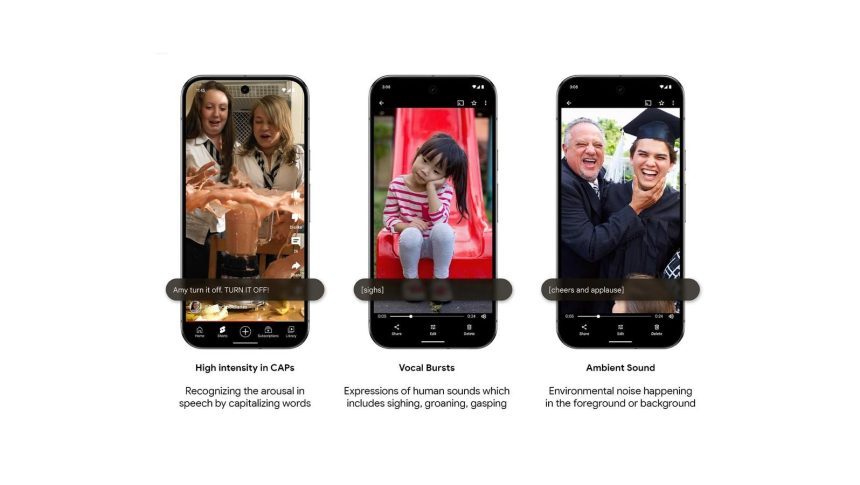Google’s Expressive Captions: A New Era of Accessibility for Android Users
Google has unveiled Expressive Captions, a groundbreaking accessibility feature for Android devices that promises to revolutionize how Deaf and hard-of-hearing individuals engage with audio and video content. Building upon the foundation of Google’s existing Live Captions, Expressive Captions leverages artificial intelligence to convey not just the words spoken, but also the underlying emotions and nuances of human communication. This innovative technology analyzes vocal attributes like tone and volume, along with ambient sounds such as crowd noise, to provide a richer and more immersive experience for users who may not be able to fully perceive auditory cues. Angana Ghosh, Director of Android Product Management, describes this as a “meaningful update,” emphasizing Google’s commitment to building products that are truly inclusive and accessible to everyone. Expressive Captions represents a significant leap forward in making digital content more equitable and engaging for a wider audience.
The development of Expressive Captions was a multi-year, collaborative effort within Google, involving teams like DeepMind and numerous other contributors. The technical intricacies involve a complex interplay of multiple AI models operating locally on the device. These models work in concert to interpret various signals from the audio, recognizing speech, non-speech sounds, ambient noises, and even transcribing speech while adding appropriate expressive stylization. This sophisticated system allows Expressive Captions to capture a more complete picture of the audio landscape, providing users with contextual information that goes beyond the literal words being spoken. Ghosh emphasizes that the seamless integration of these AI models is crucial to delivering a truly valuable and user-friendly experience.
Google’s dedication to accessibility is evident in its continuous efforts to create products that cater to the diverse needs of its users, including those with disabilities. Live Captions, introduced in 2019, marked a significant step towards making media more accessible to the Deaf and hard-of-hearing communities. Expressive Captions builds upon this foundation, aiming to bridge the gap between spoken and written communication by capturing the emotional context often lost in traditional captions. Ghosh highlights the importance of this development, noting that nuances like a sigh or a laugh can dramatically alter the meaning of a conversation, and that these subtle cues are often inaccessible to those with hearing impairments. By providing a more comprehensive representation of audio content, Expressive Captions empowers users to fully grasp the intended meaning and emotional resonance of conversations, speeches, and other forms of media.
The development of Expressive Captions was guided by extensive collaboration with experts in various fields, including theatre artists and speech-language pathologists. These consultations provided invaluable insights into the shortcomings of existing technology and the crucial elements that needed to be emphasized within audio content. By understanding the nuances of human communication and the specific challenges faced by individuals with hearing impairments, Google was able to develop a system that accurately captures and conveys the intended meaning of spoken language. This meticulous approach to development ensures that Expressive Captions provides a consistent and reliable experience across all apps and platforms, enhancing accessibility and promoting equity for all users.
While Google’s achievement with Expressive Captions is undoubtedly impressive, it’s important to acknowledge that the concept of adding emotive metadata to captions is not entirely new. Professional captioning services have long incorporated descriptors and indicators to convey ambient sounds, music cues, and other non-verbal elements within captioned content. However, Google’s implementation distinguishes itself by automating this process through AI, making expressive captions readily available and seamlessly integrated into the Android operating system. This breakthrough democratizes access to richer and more engaging captioned content, extending the benefits to a wider audience and paving the way for a more inclusive digital landscape.
The initial response to Expressive Captions has been overwhelmingly positive. Through rigorous testing and feedback from users, including members of the Deaf and hard-of-hearing communities, Google has refined the technology to ensure its helpfulness and intuitiveness. Participants in testing phases reported increased accuracy and context with Expressive Captions, validating the effectiveness of this innovative approach. Looking ahead, Google remains committed to further enhancing Expressive Captions based on user feedback, with a focus on making the feature truly helpful and equitable for everyone. The introduction of Expressive Captions represents a significant advancement in accessibility technology and holds promise for a more inclusive and engaging digital experience for all.



